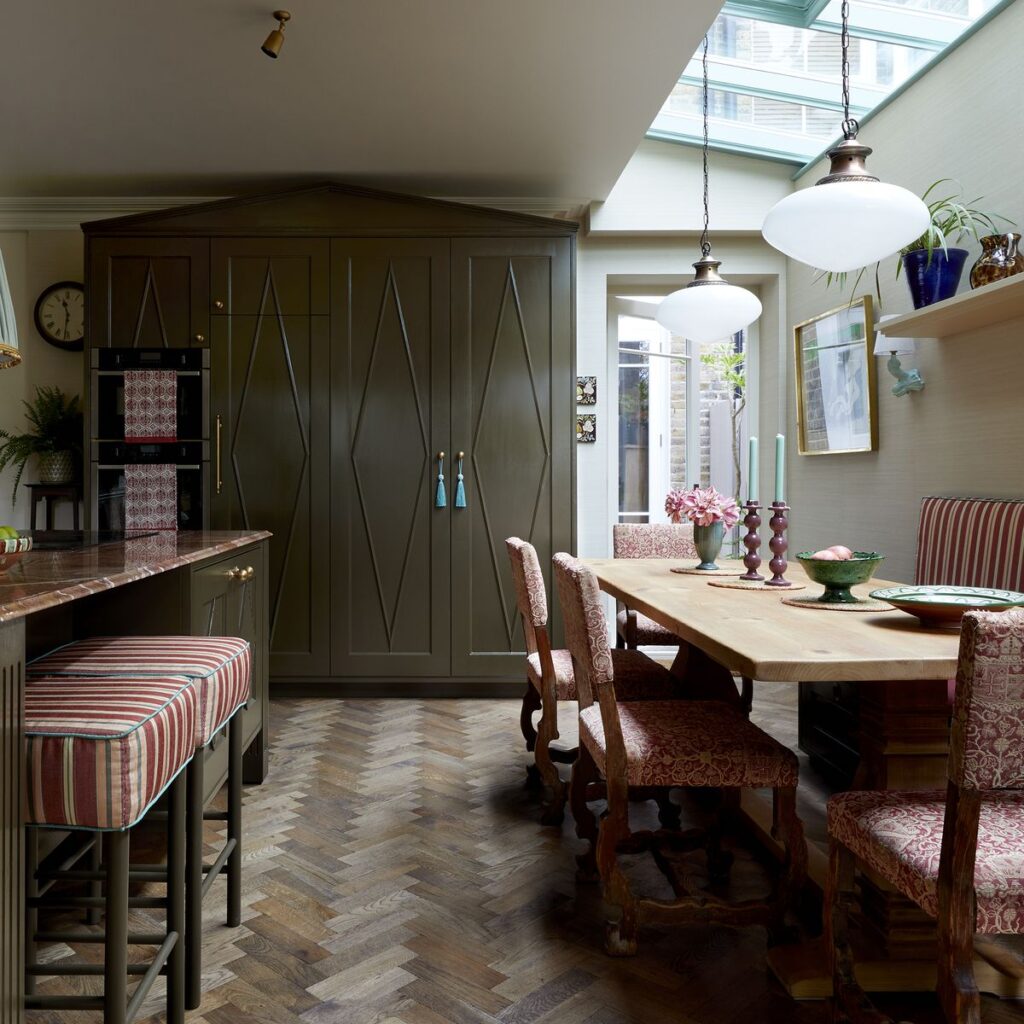As the story often goes, once you notice something in your home that bugs you, it’ll be nigh on impossible to stop seeing it. In this case, that daily irritant is the gap above kitchen cabinets – generally left unused, bar the dust that accumulates there. Luckily, we’ve found the perfect decorative answer: cupboard hats.
While the idea of popping a hat on your cupboard might sound a little bit ridiculous, it turns a wasted space into a design feature. In a Shaker kitchen idea or even a more traditional kitchen idea, the attention is all in the details, so adding little bits of architectural flair will take your kitchen up a notch.
Although cupboard hats has a lovely ring to it, the ‘proper’ term for this detail is a pediment, which have been around for centuries. So what has inspired this latest resurgence, and how do you go about adding one to your kitchen design?
We spoke to interior experts to find out whether this is something you actually need, or whether you can put the tops of your kitchen cupboards to better use.
What are ‘cupboard hats?’
Despite the affectionate term of ‘cupboard hat’, a pediment is the actual term associated with this pointy feature. It’s more commonly used on the exterior of a building or home, but as we spend more time indoors than ever before, why shouldn’t we reflect this feature back into our interiors?
‘With so many people gravitating towards traditional, timeless styles in their kitchens, cupboard hats are a great way to introduce an element of classic design. They evoke a sense of craftsmanship and heritage, which resonates with homeowners looking to move away from overly minimalist, flat-fronted cabinetry,’ explains Sophia Ayrton-Grime, founder and interior designer of Studio Raff.
Best placed in classic kitchen designs, a cupboard hat will add visual interest to an otherwise practical space. You can of course take kitchen cabinetry all the way up to a ceiling but this usually requires going down the bespoke route, which can add extra costs onto your kitchen project. A cupboard hat, however, while bespoke, is a perfect solution for one particular cabinet. You might not want them on every single wall unit, but placing a hat on a pantry unit or larder will be the cherry on top.
How to create a cupboard hat in your kitchen
The benefit of cupboard hats is that they’re quite simple to build into your kitchen design. If you’re already going down the bespoke kitchen route and are working with a builder, then it’s not too difficult to add on.
‘If you’re working with standard cabinets, a skilled carpenter can add molding or extend cabinetry with filler panels to achieve the desired effect. Painting the cupboard hats the same colour as your cabinets can create a cohesive look, while a contrasting finish can highlight the detail as a design feature,’ explains Sophia.
‘To build in cupboard hats, the first step is to consider the overall style of your kitchen. For a traditional look, opt for crown moulding with intricate details to match panelled or shaker-style cabinetry. For a more modern approach, choose a simpler, streamlined profile that complements flat-front cabinets. Most importantly, ensure the proportions are balanced – your cupboard hat shouldn’t overwhelm the cabinetry or ceiling height,’ she adds.
If you’re more DIY-savvy you can look to build a cupboard hat yourself. With some moulding and plywood (and the right tools), you can create your own decorative hat to add to a unit. Match the trim to your cornices and architraves for a complete look that looks professionally designed.
TriMold Peel and Stick Chair Rail Molding
Moulding will take your kitchen cupboard hat to the next level, and it’s incredibly easy to add on yourself thanks to peel and stick options. Match the style to your Shaker cabinets or wall panelling for a considered look.
Looking to replicate the cupboard hat in the Laura Stephens kitchen above? This khaki shade from Farrow & Ball adds on-trend appeal without being too contemporary.
The Little Greene Paint Company ‘Adventurer’
Burgundy has been a huge colour trend in 2024 and makes the perfect choice for a cosy kitchen atmosphere. Adding this shade to a cupboard hat will double down on decadence.
How to style cupboard hats
When it comes to styling cupboard hats in a kitchen, a look we love is matching the colour to your unit, but choosing a more out-there kitchen colour scheme to make a statement.
‘Painting the cupboard hats the same colour as your cabinets can create a cohesive look, while a contrasting finish can highlight the detail as a design feature,’ explains Sophia.
‘They also enable you to make a useful cupboard look like a beautiful piece of furniture. The hats can be designed around antique pieces you’ve been inspired by or by a design seen in the room elsewhere. In my own kitchen, I designed a hat to unite two cupboards – one housing a double doorway fridge and the other housing a larder cupboard. It feels totally at home in the high-ceiling kitchen room with cornice detailing,’ adds Melissa Hutley, co-founder of Hutley & Humm.
In a kitchen, the best way to make a cupboard hat the focal point of a space is to position it on a large unit that sits separately from the rest of your cupboards and paint it in a gloss colour to reflect light and increase the appearance of your ceiling height. Don’t forget to add some chic cabinet hardware (brushed brass will add to the antique appeal) for added premium appeal.
Will cupboard hats be a trend you’re trying? Or are full-height cupboards more appealing?
Read the full article here

